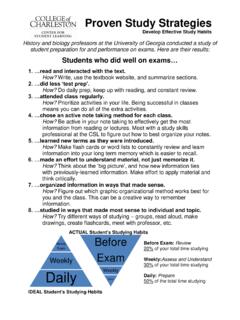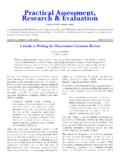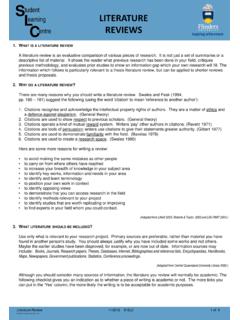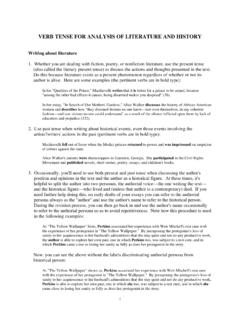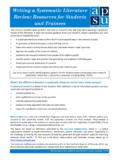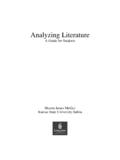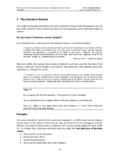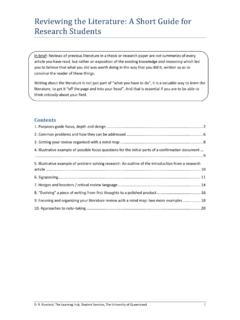Transcription of How To Handle Quotations - CofC CSL
1 literature Reviews: A Brief Guide A literature review identifies most, if not all, of the research that has been done in a particular subject area. The purpose of the investigation is to both describe and to evaluate previous studies. literature reviews are useful tools for identifying gaps or areas of disagreement in current research studies. When complete, a literature review should not only show but should also assess the current state of research in a specific area of study. The eventual aim of such a review is to lay the foundation for an intense research project.
2 A word of caution--A literature review is NOT a research paper. A research paper is a study in and of itself, while a literature review is an overview and an evaluation of many studies. How to get (1) Select a topic The topic should be extremely narrow, well researched, and of current interest. To narrow a topic, it is a good idea to begin scanning the research done in one or more broad areas. By doing this, you can at once see what and how much information exists so that you will not find yourself in a position of not having enough studies to work with.
3 It is also beneficial to write about something you are already familiar with. In this way, you will not become bored with either gathering information or writing the actual review . When beginning the initial stages of general research, it is a good idea to keep your options open until you find one or more particularly helpful articles that contribute greatly to your understanding of a topic. Such articles can be referred back to during the writing process when, for example, it becomes necessary to explain a concept well.
4 If you happen upon old review articles in the research process, those, too, can help you deepen your understanding of a given area of study. Do not underestimate the time and effort it takes to pick a topic specific enough to write a thorough literature review on. (2) Read the articles Before you can write a good review , you must have thorough understanding of your topic. This means you must read, re-read, and reflect upon the ideas and concepts presented in the articles. It is best to read the easier, well-written articles first.
5 In this way, you will not get bogged down. When you encounter a particularly difficult or poorly written article, you will already have a good understanding of the concepts from having read the easier articles. In the beginning stages of your research, scan each article to determine four key things: the research question (which will be stated in the abstract), the hypothesis (which will be in the introduction), the findings (located in the results section), and how the findings were interpreted (which is elaborated on in the discussion part of the article).
6 Make a list of these points for each article; it will help you organize your review . After picking out the main ideas in each article, begin reading in-depth. Reading carefully will help you pick out gaps in the research, discrepancies among studies, or disagreements in the way experimenters view their work. (3) Begin writing the review If you have devoted enough time to reading and digesting the articles, the writing process will be much easier than if you try to combine the reading and writing process. 843-953-5635 Carefully consider how your paper will be organized.
7 A typical literature review is set up something like this: I. Topic introduced (this should include what the topic is, why it was chosen, and why it is important) II. Specific topic narrowed to the studies/articles that will be discussed III. Brief statement which outlines how the paper will be arranged (for example, if you are investigating areas of disagreement within your topic, you might begin by explaining the controversy then follow by saying you will present all of the articles that support one side of the argument followed by the articles that support the other side) IV.
8 Describe the articles/studies in detail V. Evaluate the studies VI. Conclude with what the entire body of information shows, and suggest areas that need to be investigated further. Things to consider during the writing process: Limit the amount of direct Quotations used; paraphrasing is more effective (but don't plagiarize). Use APA format to cite your sources (or consult your professor regarding the documentation style). Do not use the typical APA headings (Intro, Methods, Results, and Discussion) in your paper. If you decide to use headings, make sure they are clear and specific, and that they divide your paper into organized parts.
9 Make certain that you are evaluating the research rather than simply describing it. Set aside time for breaks. Examples of psychology literature review topics: Multiple Personality Disorder: A review of the Journal of Psychology Critical Psychoanalytical Reviews of "The Scarlet Letter" review of the Psychology of Learning: The Impacts of Repetition in Learning and Memory literature review of Childhood: Theories of Moral Development Examples of education literature review topics: review of the Existence of the Gender Gap in Schools Reading Materials on King Arthur for a High School Medieval literature Class literature review of the Politics of Education Finance _____ References Agnes Scott College.
10 (2003). How to write a literature review . Retrieved June 16, 2003 from the World Wide Web: Northumbria University. (2002). Writing a literature review . Retrieved May 6, 2002 from the World Wide Web: : Paper Store Enterprises (2000). Dissertations and Theses. Retrieved June 30, 2003 from the World Wide Web: University of Washington. (2002). Writing a psychology literature review . Retrieved September 3, 2002 from the World Wide Web.

